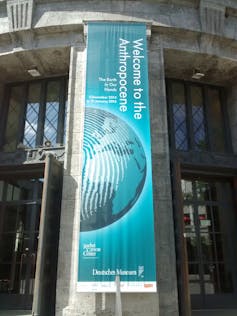| Per leggere l’articolo tradotto in italiano clicca l’icona blu (la quarta da sinistra in fondo all’articolo) google translate . Per un uso professionale e/o di studio raccomandiamo di fare riferimento al testo originale. |
Kevin Collins, The Open University
An international subcommittee of geologists recently voted to reject a proposal to make the Anthropocene an official new geological epoch, defined by humanity’s enormous impact on the planet. Assuming some protests do not overturn the ruling, it will now take another decade for the decision to be reviewed.
That may seem a long time given climate change concerns, but it is of course far less than a blink in planetary terms. The Earth can certainly wait, even if we can’t.
But sometimes big ideas like the Anthropocene take time to find meaning in our lives and perhaps their answer. How do I know? Let me tell you a story.
Nine years ago, I was in Munich visiting friends. We went on a family outing to the Deutsche Museum, a world class celebration of technology and engineering in a vast building on an islet of the River Isar. The entrance was framed on either side by very tall vertical banners, fluttering in the breeze.
Each blue-green banner had an image of the Earth with a thumbprint overlay. And in bold white lettering, variously: “Welcome to the Anthropocene / Willkommen in Anthropozän”. The subtitle read: “The Earth in Our Hands”.

Kevin Collins
I had to forgo the exhibition because my family wanted to see just about everything else. But even as I stood on the steps at the entrance, with my young son clutching my hand, it struck me as a curious title.
Why would anyone welcome anyone to the Anthropocene? Who would really want to go to that party? The invitation was, well, distinctly uninviting.
Why ‘welcome’?
I have thought about this troubling invitation on and off in the intervening years. Was “welcome” being ironic or even cynical perhaps – an invitation of despair and inevitability? But that contradicted the ethos of the museum and the academic Rachel Carson Centre which co-hosted the exhibition, where insight, learning and practical science are celebrated. So my question has remained: why “welcome”?
I finally realised an answer during a recent conversation with my PhD student Houda Khayame who is building on work between myself and colleague Ray Ison to explore how systems thinking and acting in the Anthropocene might improve governance of our environment. We were talking about how geologists have been searching for a “golden spike” in the mud or soil or Earth’s geological record as evidence of the Anthropocene ever since the term was popularised in 2000.


